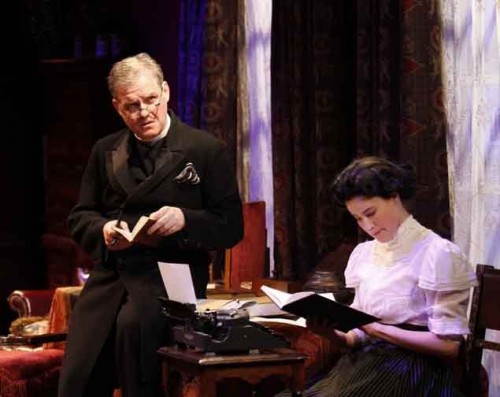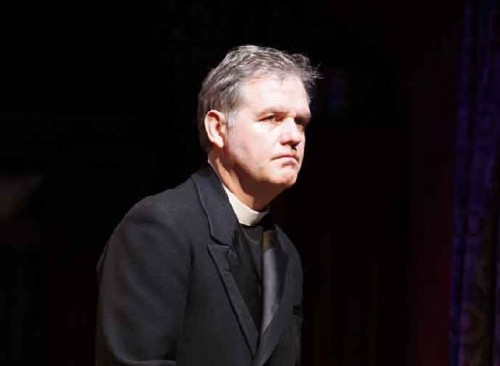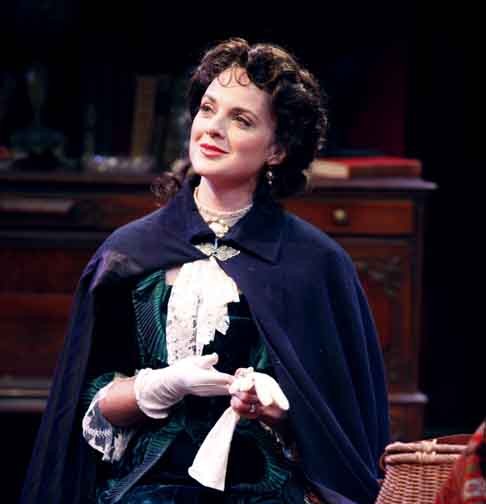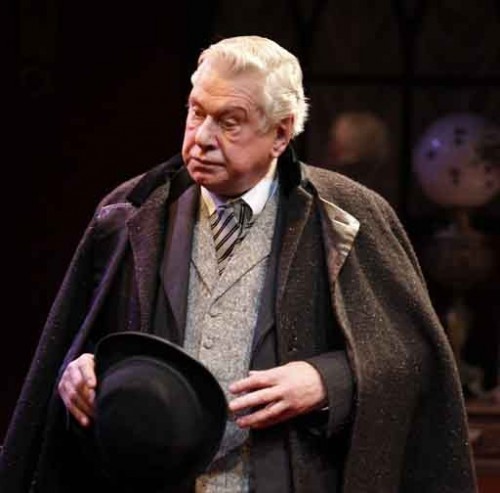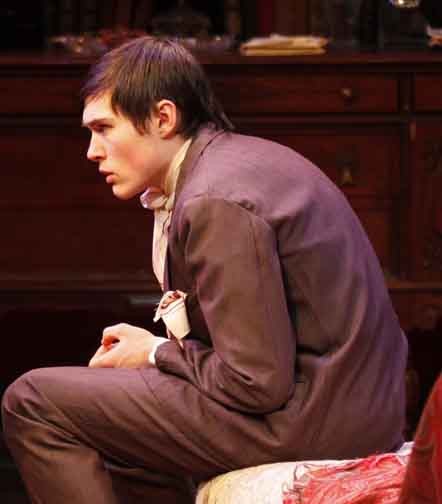Shaw's Candida at Irish Repertory Theatre
Hit Show Extended to April 28
By: Charles Giuliano - Mar 11, 2010
Candida
By George Bernard Shaw
Directed and designed by Tony Walton
Lighting by Richard Pilbrow; associate set designer, Heather Wolensky; sound by Zach Williamson and Jana Hoglund; wig and hair design by Robert-Charles Vallance; dialect coach, Stephen Gabis; production stage manager, April A. Kline; produced by Ciaran O'Reilly; co-produced by Alexis Doyle. Presented by the Irish Repertory Theater, Charlotte Moore, artistic director; Mr. O'Reilly, producing director.
Cast: Xanthe Elbrick (Miss Proserpine Garnett), Melissa Errico (Candida), Josh Grisetti (the Rev. Alexander Mill), Brian Murray (Mr. Burgess), Ciaran O'Reilly (the Rev. James Morell) and Sam Underwood (Eugene Marchbanks).
The Irish Repertory Theatre
132 West 22nd Street, Chelsea; (212) 727-2737.
Through April 18. Running time: 2 hours.
For this delightful production of George Bernard Shaw's Candida at New York's Irish Repertory Theatre the director Tony Walton has also served as set and costume designer.
He has created a warmly cluttered London drawing room with just the right touch of bric a brac. There are dark red walls and a glowing hearth of which we have a side view from the front of stage. It is a complex set as there is another view from seats on the side.
The environment conveys the comfortable domestic setting for both the office and living room of Reverend James Morell (Ciaran O'Reilly). He is a somewhat dowdy and somber middle aged advocate of a vague socialism. To do God's work he is assisted by a perky secretary Miss Prosperine Garnett (Xanthe Elbrick) who manages his busy calendar of speaking engagements and correspondence. She taps out letters on an ancient contraption. It appears that she takes low pay out of a love of God and the Reverend. This turns out to be a plot point.
The momentum of the play begins rather slowly. There is another character, the young Reverend Alexander Mill (Josh Grisetti), who appears to have difficulty getting out of bed in the morning. He is rather charmingly played but disappears for long stretches of the play. When he does return contributing little to the plot development. There is a flirtation scene with the secretary "Prossy." But mostly he takes long walks.
You sense that Shaw has stuffed the cast with characters providing sub plots that serve some comic relief but deflect from the primary love triangle. There is also Mr. Burgess (Brian Murray) a blustery scoundrel and estranged father in law of Reverend Morell. He is played broadly for some of the best laughs of the evening. It is never really clear whether Shaw intended the play to be viewed as a comedy or a lesson of love, temptation and morality. Mr. Burgess serves the device of evoking the less than saintly side of Reverend Morrell. They clash sharply about a deal gone sour several years prior. Mr. Burgess is a misogynist who abuses his female workers with miserable wages. It is "progress" that they have been replaced by machines.
It takes forever before Candida (Melissa Errico), the wife of Reverend Morell, to arrive on stage. She makes a grand entrance carrying a wicker hamper. Walton has dressed her in a stunning green velvet dress with a sweeping train. She is beautiful and voluptuous the essence of Victorian taste, style and beauty. Rather too much so it seems for the prim and proper Reverend. She is perhaps too obviously his heaven on earth, greatest possession, (how Victorian) and, perhaps, downfall.
Candida has returned from the country where the children remain. With her presence the intensity of the drama ratchets up and solidifies.
Wafting along in her jet stream is the effete young poet, a mere splinter and stripling of manhood, the aspiring poet Eugene Marchbanks (Sam Underwood). He is her latest project. If her husband saves souls, it seems that Candida rescues lost poets. He is from a noble family but just can't seem to survive in the pressure cookers of Eaton and Oxford. His psyche is just too tender for peer pressures. He is indeed a parody of the Lake Poets whom Shaw seems to be skewering.
But unlike most sniveling bards of that time, think Oscar Wilde and Lord Alfred "Bosey" Douglas, Eugene is not at all ambivalent about his sexual orientation. He just adores, loves with passion, Candida. As he relates to the Reverend in an intense dialogue, But of course you love her, Morell exclaims, we all do. And rightly so. But it seems, Edward asserts, she loves me too.
The immediate angry impulse of Morell is to toss the silly boy out of the house. We see his rather unholy rage including physical threats. But Candida arrives and insists that he stay for lunch. And help her with some household chores. It appears that the short staffed household requires her to do more work that appropriate for a lady of her rank and station. As Edward sharply points out. It seems that she is constantly busy seeing that the Reverend is left to pursue the Lord's work.
There is a plot twist where, after lunch, the Reverend does indeed accept that speaking engagement. He is joined by his entourage and father in law but insists that Candida and Edward remain behind. Alone by the fire. It is an act of his faith and trust, as well as, a test of his wife's fidelity. There is this superannuated notion that Morell loves her so much he will allow her to follow her heart.
While they are alone Edward never plucks himself up to a declaration of love and seduction. Instead he puts her to sleep, barefoot on the chaise in a gauzy white gown, with two hours of non stop poetry. Brevity is the soul wit. A quality lost on this inexperienced young lover.
They are interrupted by the return of Morell who is anxious to know what has transpired. Nothing it seems. Then, with comic flourish, the room is filled with Prossy, drunk on her first champagne, Mr. Burgess, and the young Reverend. They enjoyed a fine meal after the sermon. Shaw insists on a distraction before the unfolding of the ultimate question.
When finally alone the rivals insist that Candida choose between them. We see a change in her. Errico plays her with a harshness that seems too abrupt from her former demeanor. She is too much in control and seemingly enjoying the power. She states that she is, in effect, on the auction block; the prize of the highest bidder. What then do they offer her?
The Reverend utters a classic Shavian speech on love, service, and domestic commitment. He is the husband, father, and good provider. Edward when given his turn offers, romance, youth, passion and poetry.
Candida states that she will choose the weaker of the two. The Reverend slumps in apparent defeat. But Edward understands that he has lost.
Candida then utters a soliloquy of her husband's adorable vulnerability and her devotion. She is indeed the perfect wife. How British (or Irish) and Victorian. So this ends as a morality play.
That said, Shaw in this love triangle falls short of Tolstoy. Candida is no Anna Karenina. She has opted for domestic bliss and all its little chores. But then Edward is no dashing Count Alexei Kirillovich Vronsky. Candida opts to tend to the hearth rather than toss herself under an oncoming train.
That virtue prevails so flawlessly mars this cozy production. This work by Shaw, however neatly produced, with all of the wit and charm of the Irish Repertory Theatre, just seems too dated. It is indeed a lovable chestnut but needed a bit more roasting.
Candida boils down to Tanmy Wynette's Stand by Your Man. While the IRT played it straight this cries out for a hilarious, farcical deconstruction. Without a touch of irony Candida is a bit hard to take. In real life she would have been touched by the poet. Perhaps it is Shaw who was the prig and not just the Reverend Morell.

